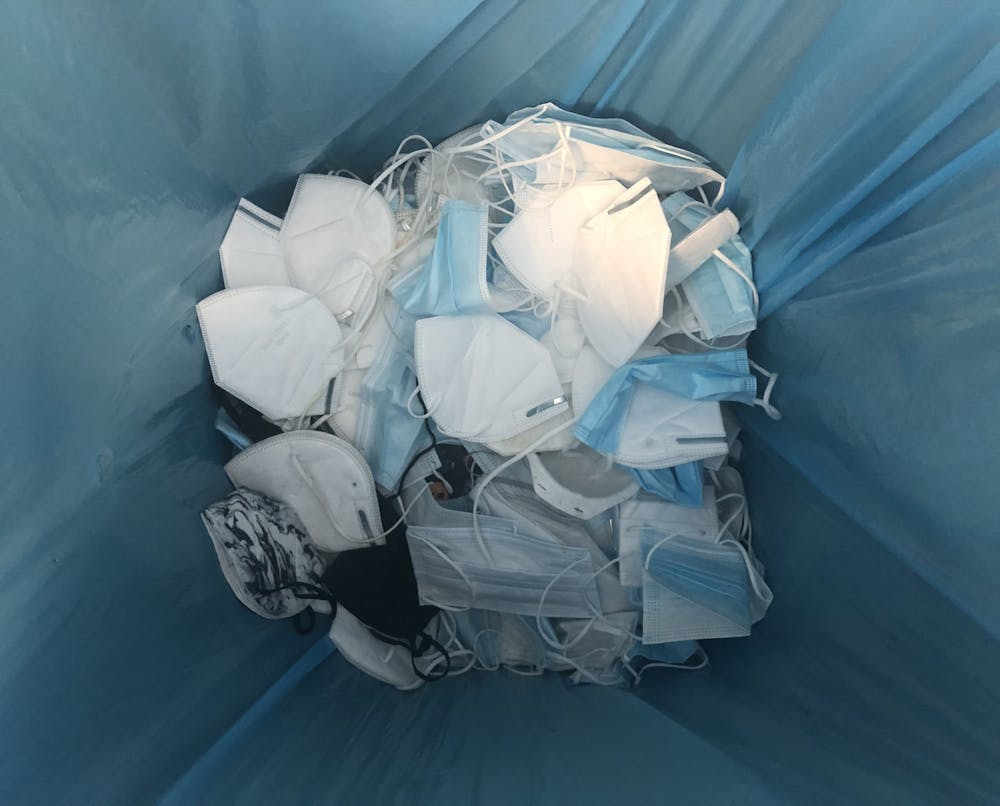GreenUR's mask recycling program awaits the disposable masks laying around campus with drop-off locations in Tyler Haynes Commons and Gottwald Center for the Sciences.
GreenUR, the student-led environmental and sustainability club, launched the mask recycling program in October and expanded it when the administration urged the use of disposable surgical and KN95 masks, said senior Indya Woodfolk, president of GreenUR.
"We wanted to have something there in place to decrease the waste we were producing," Woodfolk said.
Between March 2020 and January 2022, UR administration had distributed over 754,000 disposable masks to the community and visitors, Hugh Elwood, purchasing agent for procurement and strategic sourcing, wrote in an email to The Collegian.
"When we saw [the recycling program] was working well, we ordered another [mask recycling box] to have two separate locations," Woodfolk said. The first box was placed in the Commons, and the second box has moved around campus from the Weinstein Recreation Center to Gottwald.
GreenUR purchased the Zero Waste boxes from TerraCycle, a recycling company. Woodfolk said that recycling masks differed from typical everyday recycling.
"Regular recycling is a little bit tricky because you do have to make sure your plastic bottles are a certain type of plastic, and the plastic bottle has to be clean," Woodfolk said. "But with the mask recycling program, we really just wanted to make it super easy for people to recycle their masks. You don't have to clean them, you don't have to do anything, you just dump your mask into the container and you're good to go."
Taylor Coleman, senior and vice president of GreenUR, specified that the recycling program only collects disposable surgical/dust masks, KN95 and N95 masks to filter these products from mainstream landfill, she wrote in an email.
GreenUR sends the masks to TerraCycle, whose employees assess the material composition, sort, clean and send the masks to manufacturing companies to create the final product, which changes depending on the manufacturing company's needs, according to its website.
The cost of the mask recycling boxes adds up, Woodfolk said. A small box is around $80 and a large box is approximately $200. The boxes are returned to TerraCycle once they are filled with masks.
GreenUR has already sent over 200 masks from one small box to TerraCycle, Woodfolk wrote in an email. GreenUR is also promoting the mask recycling program on its Instagram account and in SpiderBytes, Woodfolk said.
"I feel like it's pretty hard to miss when you're walking through [the Commons]," Woodfolk said. "We definitely could do a better job broadcasting it to people … who may not be environmentally focused or environmental majors."
Enjoy what you're reading?
Signup for our newsletter
The number of masks collected so far has been lower than anticipated, and Coleman suspects some factors, such as accessibility and mask mandates, have likely decreased participation in the program, she wrote.
"I honestly feel like while many [students] know, they do not take the initiative to collect their disposable masks on their own to be added to the boxes," Coleman wrote. "Out of convenience, it is easier to dispose of the single-use masks when you are not within range of one of the collection boxes."
Woodfolk said with changing mask mandates and depending on COVID-19, she could not predict the future of the mask recycling program.
"It's definitely been a really great thing for our campus," she said.
Contact copyeditor Emily Weiner at emily.weiner@richmond.edu
Support independent student media
You can make a tax-deductible donation by clicking the button below, which takes you to our secure PayPal account. The page is set up to receive contributions in whatever amount you designate. We look forward to using the money we raise to further our mission of providing honest and accurate information to students, faculty, staff, alumni and others in the general public.
Donate Now



